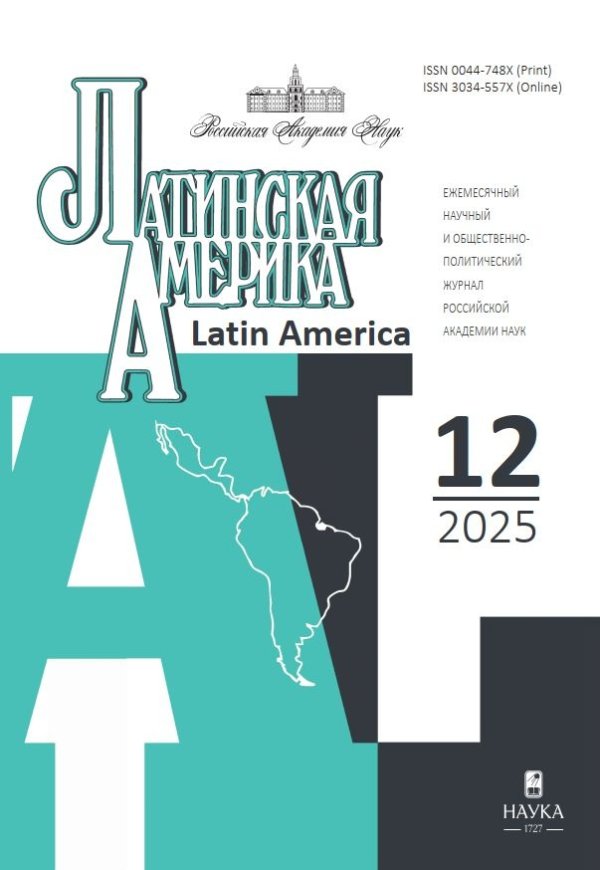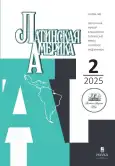№ 2 (2025)
Политика
ЯДЕРНАЯ ПОЛИТИКА БРАЗИЛИИ: ЭВОЛЮЦИЯ, ПРОБЛЕМЫ И ПЕРСПЕКТИВЫ
Аннотация
Нынешний уровень развития Бразилии в ядерной сфере является результатом сочетания целого ряда внутренних, региональных и международных факторов. Постоянное внимание к состоянию науки и технологическому прогрессу со стороны государства, наличие собственных источников радиоактивных материалов, а главное — политическая воля руководителей страны, вне зависимости от идеологических различий и политических предпочтений рассматривавших развитие национальной ядерной программы (как в мирных, так и военных целях) как важную составную часть прогресса нации, — все это позволило Бразилии добиться серьезных успехов в указанной сфере. Однако это было бы невозможно без международного сотрудничества. В данной статье на основе исторического анализа показано, как и почему происходила переориентация бразильского руководства с полной зависимости от помощи США к полноценному сотрудничеству в рамках BRICS.
 6-18
6-18


Современные практики общественной заботы о детях в Бразилии
Аннотация
В статье рассматривается трансформация воспитательных практик в современных семьях Бразилии. В условиях развития урбанизации традиционная родственная помощь бабушек и дедушек по уходу за детьми уступает место неродственным формам коллективной заботы о детях. Согласно сведениям, содержащимся в источниках, примерно половина женщин, живущих в бедных городских кварталах, отдают детей на попечение в другие семьи или в приюты. В статье подробно рассмотрены современные практики таких форм общественной заботы о детях, как бразильское усыновление (adoção à brasileira) и направляемое усыновление (adoção intuiti personae). Эти практики, иногда реализующиеся в обход официальной «буквы закона», в большинстве случаев ориентированы на создание благоприятных условий воспитания усыновляемого ребенка и нацелены на формирование социальной привязанности между несовершеннолетним воспитанником и его опекуном. Следует отметить, что в бразильском обществе большое значение придается социальной интеграции его членов, всецело инкорпорированных в многочисленные социальные сети в условиях роста городов. При этом практики общественной заботы о детях могут рассматриваться как проявление эусоциальных черт организации общества в современной Бразилии.
 19-31
19-31


Народный суверенитет — переосмысление философии Хосе Артигаса применительно к современной ситуации в Латинской Америке
Аннотация
В данной работе авторы предприняли попытку переосмыслить понятие Народного суверенитета — основы политической науки и международных отношений, — которое ввел в оборот Хосе Артигас. В начале XIX в. этот мыслитель и правитель Восточного Берега Уругвая служил для народов региона ориентиром в освободительной борьбе против колонизаторов. Богатое философское наследие Х.Артигаса позволило нам переосмыслить некоторые его положения применительно к современной ситуации, которая сложилась в странах Латинской Америки и Карибского бассейна. Для анализа мы использовали его тезисы революционного контекста; социальные основы освободительного движения; процессы народного управления. На этой основе мы делаем выводы о верховенстве понятия Народного суверенитета как волеизъявления народов и той роли, которую он играет в развитии интеграционных процессов в нашем регионе.
 32-43
32-43


Иберийский аспект
Социальные факторы электорального поведения на всеобщих парламентских выборах в Испании (2023 г.)
Аннотация
В статье рассматриваются социальные факторы электорального поведения на парламентских выборах в Испании 23 июля 2023 г., повлиявшие на голосование. Долгосрочными факторами являются социальные размежевания между группами граждан с повышенными и пониженными доходами, между сторонниками централизации или сецессионизма, левыми и правыми. Экономический рост, наблюдавшийся после пандемии, привел к снижению уровня безработицы. Данный фактор обусловил сокращение поддержки на выборах 2023 г. новых партий — Sumar и VOX и значительный рост поддержки правоцентристской Народной партии (Partido Popular, PP). Испанская социалистическая рабочая партия (Partido Socialista Obrero Español, PSOE) смогла сохранить влияние на фоне ослабления партнеров по коалиции. Установлено, что граждане с низкими доходами в большей мере поддерживают Partido Popular, PSOE и VOX, а с высокими — партию Sumar. Количество голосов, отданных за PSOE, РР и VOX, увеличивается там, где фиксируется высокий уровень безработицы, а поддержка Sumar — снижается. PSOE и VOX поддерживают там, где снижен удельный вес лиц с высшим образованием; поддержка Sumar имеет прямо пропорциональную зависимость от уровня образования; поддержка PP не зависит от этого фактора. Электорат PSOE и РР более пожилой, чем VOX и Sumar. Установлены ареалы повышенной поддержки основных партий в автономных сообществах и крупных городах.
 44-58
44-58


Социальные проблемы
Зигзаги венесуэльской миграции
Аннотация
Статья посвящена анализу миграционных процессов в Венесуэле, начиная с 1930-х годов, а также условий пребывания венесуэльских мигрантов в принимающих странах Южной Америки в конце 2010-х и начале 2020-х годов. Рассматриваются факторы, которые привели к изменению страновой структуры миграционных потоков в 60-е—80-е годы ХХ в. и к перелому в миграционной тенденции на рубеже 80-х—90-х годов. Особое внимание уделяется причинам нынешнего миграционного кризиса и проблемам венесуэльцев в принимающих государствах. В статье также приводится краткосрочный прогноз миграционных тенденций.
 59-72
59-72


На пути к Картахене +40: особенности защиты беженцев в Латинской Америке
Аннотация
Статья посвящена правовым и институциональным основам режима Картахенской декларации о беженцах 1984 г. На фоне современных массовых миграционных потоков показаны особенности региональной системы защиты беженцев и вынужденных мигрантов. Рассматриваются механизмы и инструменты Картахенского процесса как новаторской модели регионального сотрудничества по решению проблем вынужденных мигрантов, а также достижения и пути совершенствования в преддверии нового десятилетнего цикла Картахена+40. Определяется специфика приема и защиты разных категорий вынужденных мигрантов и беженцев в Латинской Америке.
 73-86
73-86


Страницы истории
Майяские волонтеры на службе Национальной гвардии Юкатана (1847–1851)
Аннотация
Война Каст на Юкатане (1847–1901) зачастую воспринимается в историографии как расовая или этническая война между «белыми» и «индейцами майя». Однако, под поверхностью историографического или газетного бинарного дискурса наблюдется гораздо более сложная этническая картина комплектования правительственных вооруженных сил. Цель статьи: выявить мотивы участия индейцев майя в войне в рядах правительственных войск и восприятие этого феномена «белым» юкатанским обществом в наиболее острый период войны.
 87-101
87-101


Размышляя о прочитанном
Карибская история мировой революции
Аннотация
Рецензируемая книга Сандры Пухальс — результат исследования малоизученной истории становления коммунистического движения в Карибском бассейне, в первую очередь в Пуэрто-Рико. Автор, на базе ранее неизвестных архивных документов, сумела показать противоречия развития революционного движения в Пуэрто-Рико, характер отношений Карибского бюро Коминтерна и компартии США в вопросах формирования антиимпериалистического и коммунистического движения на Карибах, восстановила неизвестные эпизоды биографий участников событий.
 102-110
102-110











